English words from Chinese Origin
外宣翻译中中国特色词汇
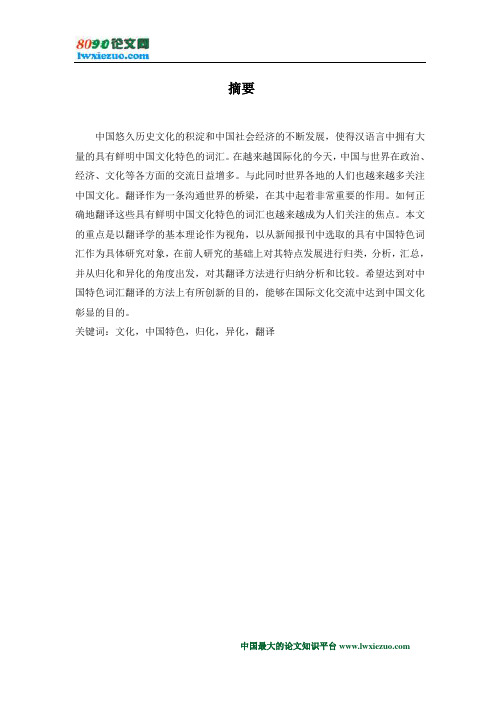
摘要中国悠久历史文化的积淀和中国社会经济的不断发展,使得汉语言中拥有大量的具有鲜明中国文化特色的词汇。
在越来越国际化的今天,中国与世界在政治、经济、文化等各方面的交流日益增多。
与此同时世界各地的人们也越来越多关注中国文化。
翻译作为一条沟通世界的桥梁,在其中起着非常重要的作用。
如何正确地翻译这些具有鲜明中国文化特色的词汇也越来越成为人们关注的焦点。
本文的重点是以翻译学的基本理论作为视角,以从新闻报刊中选取的具有中国特色词汇作为具体研究对象,在前人研究的基础上对其特点发展进行归类,分析,汇总,并从归化和异化的角度出发,对其翻译方法进行归纳分析和比较。
希望达到对中国特色词汇翻译的方法上有所创新的目的,能够在国际文化交流中达到中国文化彰显的目的。
关键词:文化,中国特色,归化,异化,翻译ABSTRACTWithin the long history and along with the fast social and economic development, Chinese language has gained a large amount of words with cultural characteristics. In this more and more globalized world, China has more and more communication with the rest of the world in every aspect of our life. At the same time, people are being more and more interested in Chinese culture. Translation-as a way to help people understand each other - plays a very important role in this point. How to translate these words with distinctive Chinese cultural characteristics in a proper way has always been heatedly debated. This thesis aims to take same typical cultural words as our sample, base on the theories in translation study and the previous studies in this area, to give a thorough analysis about the category and classification of this kind of words. Also this thesis will discuss about the ways in translating these words from the prospective of domestication and foreignization. This thesis is expecting to have some innovations in the ways of translation, which will help the display of Chinese culture.Key Words:Culture, Chinese characteristics, domestication, foreignization, translationCONTENTS1. Introduction (4)2. Backgrounds of words with Chinese characteristics (5)2.1 Forming of words with Chinese characteristics (5)2.2 Classification and features of words with Chinese characteristics (5)3. Mistakes in translating words with Chinese characteristics (7)3.1. Translating literally without knowing the deep meaning (8)3.2. Translating in Chinese thinking without caring about English language habits .. 9 3.3. Translating without knowing the origin of the words (9)4. Methods for translating words with Chinese characteristics (10)4.1 Basic theories for the ways of translating words with Chinese characteristics (10)4.1.1 The theory of domestication (10)4.1.2 The theory of foreignization (11)4.2 Methods for translating words with Chinese characteristics (11)4.2.1 Transliteration (11)4.2.2 Transliteration plus graphs, paraphrase or suffix (13)4.2.3 Literal translation (13)4.2.4 Literal translation plus paraphrase (14)4.2.5 Literal translation to create new words (14)4.2.6 Literal translation plus free translation (14)4.2.7 Free translation (15)5. The comparison between domestication ways and foreinization ways (18)6.Conclusion (19)Acknowledgements .................................................. 错误!未定义书签。
Origins of English英语的起源
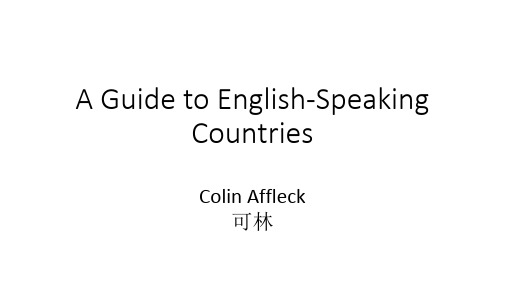
Reading list
Primary reading: • Xie Fu Zhi (ed.), A Guide to English-Speaking Countries, (Beijing: Foreign Language Teaching and Research Press, 2014) Secondary reading: • Robert V. Remini, A Short History of the United States, (New York: HarperCollins Publishers, 2008) • Peter Clarke, Hope and Glory: Britain 1900-2000 (The Penguin History of Britain), (London: Penguin Books, 2004) • Magnus Magnusson, Scotland: The Story of a Nation, (New York: HarperCollins, 2001) • Simon Jenkins, A Short History of England, (London: Profile Books, 2012)
Class overview
1. Linguistic genesis: early Britain and the origins of English language 2. The Picts, Celts and origins of Scotland 3. The Act of Union, it’s history and ramifications 4. English Literature 1: Poetry and epic from Chaucer to Milton 5. The rise of the British Empire 6. Britain’s industrial revolution 7. America United: the revolutionary war: tea, tariffs and representation 8. America Divided: the civil war 9. Mid-term examination 10. English Literature 2: Romanticism to Modernism 11. The world at war: how Britain, the colonies and America coped during two world wars 12. The decline and fall of the British Empire 13. Ireland: from colonisation to the Troubles and Good Friday agreement 14. American dream, Manifest Destiny and a new Empire 15. Post war Britain: a new Jerusalem and the Windrush 16. The end of the Union? Examining modern Scotland 17. Final examination
#四六级必备中国文化中英文对照必备

1. 中国龙对龙图腾的崇拜在中国大约已绵延了八千多年。
中国龙是古人将鱼,蛇,马,牛等动物和云雾,雷电等自然天象集合而成的一种神物。
中国龙的形成和中华民族的多元融合过程同步。
在中国人的心目中,龙具有振奋腾飞,开拓变化的寓意和团结凝聚的精神。
Chinese DragonDragon totem worship in China has been around for the last 8,000 years. The ancients in China considered the dragon (or Loong) a fetish that combines animals including the fish, snake, horse and ox with cloud, thunder, lightning and other natural celestial phenomena. The Chinese dragon was formed in accordance with the multicultural fusion process of the Chinese nation. To the Chinese, the dragon signifies innovation and cohesion.2. 饺子饺子是深受中国人民喜爱的传统特色食品。
相传为古代医圣张仲景发明。
饺子的制作是包括:1)擀皮、2)备馅、3)包馅水煮三个步骤。
其特点是皮薄馅嫩,味道鲜美,形状独特,百食不厌。
民间有“好吃不过饺子”的俗语。
中国人接亲待友。
逢年过节都有包饺子吃的习俗,寓意吉利。
对崇尚亲情的中国人来说,“更岁交子”吃饺子,更是欢度除夕、辞旧迎新必不可少的内容。
DumplingsDumplings are one of the Chinese people’s favorite traditional dishes. According to an ancient Chinese legend, dumplings were first made by the medical saint—Zhang Zhongjing. There are three steps involved in making dumplings: 1) make dumpling wrappers out of dumpling flour; 2) prepare the dumpling stuffing; 3) make dumplings and boil them. With thin and elastic dough skin, freshen and tender stuffing, delicious taste, and unique shapes, dumplings are worth eating hundreds of times. There’s an old saying that claims, “Nothing could be more delicious than dumplings.” During the Spring Festival and other holidays or when treating relatives and friends, Chinese people like to follow the auspicious custom of eating dumplings. To Chinese people who show high reverence for family love, having dumplings at the moment the old year is replaced by the new is an essential part of bidding farewell to the old and ushering in the New Year.3. 针灸针灸是中医学的重要组成部分。
Chapter 2 - Diction
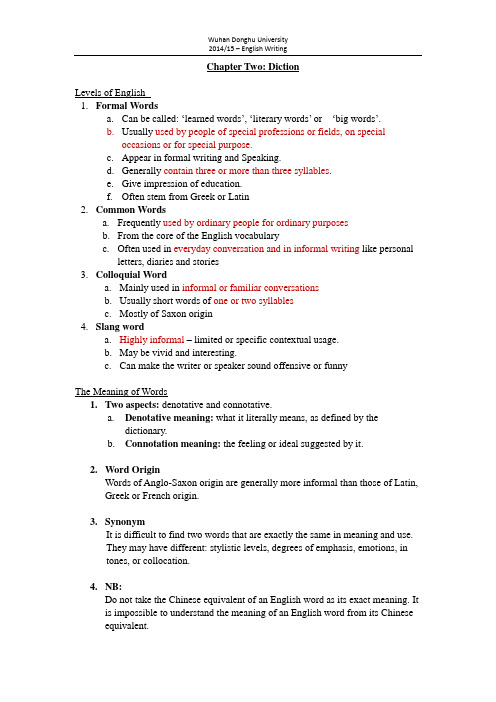
Chapter Two: DictionLevels of English1.Formal Wordsa.Can be called: ‗learned words‘, ‗literary words‘ or ‗big words‘.ually used by people of special professions or fields, on specialoccasions or for special purpose.c.Appear in formal writing and Speaking.d.Generally contain three or more than three syllables.e.Give impression of education.f.Often stem from Greek or Latinmon Wordsa.Frequently used by ordinary people for ordinary purposesb.From the core of the English vocabularyc.Often used in everyday conversation and in informal writing like personalletters, diaries and stories3.Colloquial Worda.Mainly used in informal or familiar conversationsually short words of one or two syllablesc.Mostly of Saxon origin4.Slang worda.Highly informal– limited or specific contextual usage.b.May be vivid and interesting.c.Can make the writer or speaker sound offensive or funnyThe Meaning of Words1.Two aspects: denotative and connotative.a.Denotative meaning: what it literally means, as defined by thedictionary.b.Connotation meaning: the feeling or ideal suggested by it.2.Word OriginWords of Anglo-Saxon origin are generally more informal than those of Latin, Greek or French origin.3.SynonymIt is difficult to find two words that are exactly the same in meaning and use.They may have different: stylistic levels, degrees of emphasis, emotions, intones, or collocation.4.NB:Do not take the Chinese equivalent of an English word as its exact meaning. It is impossible to understand the meaning of an English word from its Chineseequivalent.5.Understandinga.To understand the meaning of an English word; find out how it is definedin a dictionary with explanations and contextual/practical usage.b.You do not know a work unless you can explain: what it means, theemotions it gives, when to use it and why you would use it.General & Specific Words1.General words:a.Words referring to groups or classes not to individual things2.Specific Wordsa.Words referring to individual persons, objects or events.b.Specific words help to make writing clear, exact, vivid, and striking:they are more informative and expressive than general words.ageing specific words should go along with providing details – Creatingeffective and impressive writing.b.The more detail the betterc.Mix emotions, feelings, visual observations and other senses together tocreate a full picture of your meaningIdioms1.Idioms:a. A fixed group of words with a special meaning which is different from themeaning of the word that form it.b.Frequently used in speech and writing.c.They help to make one‘s language sound natural and idiomatic.d.NB: idioms should be ‗peppered‘ – do not use them too muche.NB: Idioms are fashionable – do not use old or out of fashion idioms.age:a.Most idioms are informal or colloquial in style and can be used inconversation; but a few are slang and should be used with care.b.Many idioms have become clichés and are no longer fresh or interestingand should be used sparingly.Figures of Speech1.Simile:a. A comparison between two distinctly different things and the comparisonis indicated by the word as or like.b.Example: ‗He sleeps like a pig‘2.Metaphor :a.The use of a word which originally denotes one thing to refer to anotherwith a similar quality. It is also a comparison, but the comparison isimplied, not express with the word as or like.b.Example: ‗He is an Ox‘3.Personification:a.Treating a thing or an idea as if were human or had human qualities.b.In poetry personification is very common.c.Example: ‗The wind whispered to me…‘4.Metonymy:a.Substituting the name of one thing for that of another with which it isclosely associated.b.Example: ‗The White House –American Government‘5.Synecdoche:a.When a part is substituted for the whole or the whole is substituted for apart.b.Example: ‗Mexico Vs. Kazakhstan‘ [a football match: two teams]6.Euphemism:a.It is the substitution of a mild or vague expression for a harsh orunpleasant one.b.Speaking of something in a allusive mannerc.Example: ‗We watched a DVD together‘ [a Boyfriend & Girlfriend in abedroom]7.Irony:a.It is the use of words which are clearly opposite to what is meant, inorder to achieve a special effect.b.Example: ‗you are the best parents in the world‘ [during an argument]8.Overstatement and understatement:a.In overstatement the diction exaggerates the subject.b.Example: ‗this bag weighs a ton!‘c.In understatement the diction plays down the magnitude or value of thesubject.d.Example: ‗this bag weighs nothing!‘9.Transferred epithet:a. A transferred epithet is one that is shifted from the noun it logicallymodifies to a word associated with that noun.b.Example: ‗Brave Achilles‘, ‗Grey-Eyed Athena10.Oxymoron:a.In oxymoron apparently contradictory terms are combined to produce aspecial effect.b.Example: ‗The friendly Shark ‘11.Alliteration:a.It refers to the appearance of the same initial consonant sound in two ormore words.b.Example: ‗amazing maize maze‘Dictionariesing dictionariesa. A foreign learner of English needs to keep a good dictionary handy whenhe reads or writing, it will help him a great deal in learning and usingwords.b.Look it up in a dictionary when in doubt about spelling, division, andpronunciation of a word.c.To one learning to write, the most useful information a dictionary containsis the definitions, together with examples or illustrations and usage labelsand note.d.Words that are not labeled in a dictionary are supposed to belong to thegeneral vocabulary, and therefore they can be used for ordinary purposes.e.NB: Do not rely on your phone translators, they cannot understandcontextual usage!Questions1.Read the following passage carefully and then answer the questions:Language is our facility to talk to each other. The word ‗talk‘ is used not merely to avoid a rather more technical and high-sounding word like ‗communicate‘; talk is more precise and more relevant to the special nature of human language than ‗communicate‘.In the first place, all creatures –cats, sparrows , and bees —can be said to communicate with each other to some extent. They can attract each other‘s attention, warn of danger, woo their mates, and direct the way to food. We are still learning just how well animals can communicate with each other, but there can be no doubt that animal communicate is wholly rudimentary as compared with the complex and subtle control of language possessed by even the least intelligent or least educated of us.It is therefo re appropriate to say that language involves ‗talk‘ to emphasize that language is a peculiarly human activity.Questions:a.Is the style of the passage formal or informal?b.From what type of book is this passage taken? What do you think is thepurpose of the book?c.Is the book written for scientists or for ordinary readers?d.Are there slang expressions in the passage? Are there formal words in it?Give examples2.Look at the following word which are formal words which are informal words?3. In each sentence, choose the more precise of the two in italics, and explain your reasons.a. A few listeners were disinterested / uninterested and dozed off.b.Though she has grown up, her behavior is often childlike / childish.c.I am quite jealous / envious of your opportunity to study at such a famousuniversity.d.Her clothes, though made of cheap / inexpensive material, are quite elegant.e.This homely / ugly old man is a well-known musician.f.I am sorry to refuse / decline your invitation.g.He was surprised / stunned to find that his little sister had become a pretty,slim / skinny young woman.h.My uncle become fat / stout as he grew older.i.this servile man was especially modest / humble when he was talking with hissuperiors.j.I asked every / each boy in the group the same question, and interestingly, everyone / each gave me a different answer.k.The enemy troops were driven back when they attempted / tried to cross the border.l.They all felt sympathy/ pity for the victims of the disaster and made donations.m.Empress Dowager Cixi was famous / notorious for her cruelty.n.Is that old / elderly woman / lady sitting on the bench your mother?o.4.The following words are rather general in meaning. Think of a word that is morespecific. the figure of the speech of the following sentences:a.As cold waters to a thirsty soul, so is good news from a far country.明喻b.We are lucky, what you said makes me feel real good.反语c.I spent sleepless nights on my project.转类修饰语d.The world is a stage.暗喻e.The fair breeze blew, the white foam flew, the furrow followed free.头韵法f.Her rich relatives rained birthday presents on her only son.暗喻g.Wrong ideals may harm a man just like diseases明喻h.Some words may be defaced by careless usage.Transferred Epithet 移位修饰i.The leaves are trembling in the cold wind.拟人j.The storm was so angry that it wanted to destroy everything in its way.拟人k.Many people bowed before Force, but eventually Force would surrender to Reason.拟人l.Selfless people are like cows, which eat straw but produce milk.明喻m.―W hat do you think of the roast duck?‖ ―Not bad.‖委婉语n.His friends praised his daughter‘s performances to the skies.夸张o.His writing is clear and clean. 头韵法p.His unfriendly tongue surprised her. 移位修饰q.There is fertile soil for popular music in China today.暗喻r.I felt as a bird must feel when it has flown across the ocean and comes upona creature that knows its nest.明喻s.He is so fascinating to me, even the fish smell on his hand was kind of perfume.暗喻t.She is a social butterfly .暗喻u.Nobody disputes the need to answer nature‘s most basic call, but some wonder who should foot the bill for an adequate supply of public toilets.v.I should said that, reticence was not your strong point.。
english words of chinese origin 中式英语
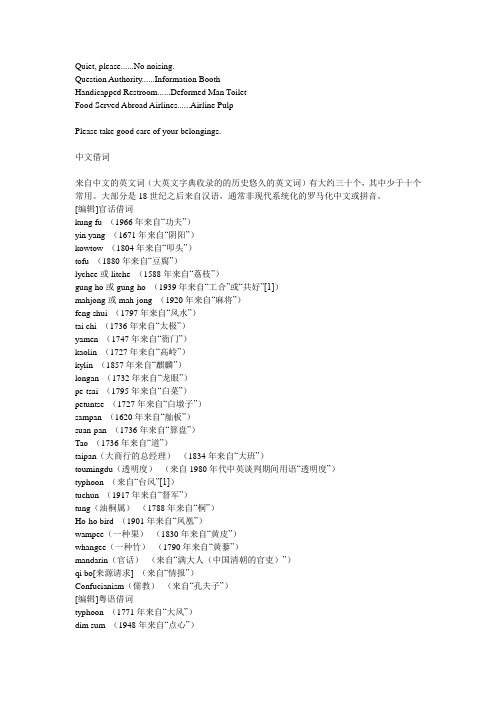
Quiet, please......No noising.Question rmation BoothHandicapped Restroom......Deformed Man ToiletFood Served Abroad Airlines......Airline PulpPlease take good care of your belongings.中文借词来自中文的英文词(大英文字典收录的的历史悠久的英文词)有大约三十个,其中少于十个常用。
大部分是18世纪之后来自汉语,通常非现代系统化的罗马化中文或拼音。
[编辑]官话借词kung fu (1966年来自“功夫”)yin yang (1671年来自“阴阳”)kowtow (1804年来自“叩头”)tofu (1880年来自“豆腐”)lychee或litche (1588年来自“荔枝”)gung ho或gung-ho (1939年来自“工合”或“共好”[1])mahjong或mah-jong (1920年来自“麻将”)feng shui (1797年来自“风水”)tai chi (1736年来自“太极”)yamen (1747年来自“衙门”)kaolin (1727年来自“高岭”)kylin (1857年来自“麒麟”)longan (1732年来自“龙眼”)pe-tsai (1795年来自“白菜”)petuntse (1727年来自“白墩子”)sampan (1620年来自“舢板”)suan-pan (1736年来自“算盘”)Tao (1736年来自“道”)taipan(大商行的总经理)(1834年来自“大班”)toumingdu(透明度)(来自1980年代中英谈判期间用语“透明度”)typhoon (来自“台风”[1])tuchun (1917年来自“督军”)tung(油桐属)(1788年来自“桐”)Ho-ho bird (1901年来自“凤凰”)wampee(一种果)(1830年来自“黄皮”)whangee(一种竹)(1790年来自“黄藜”)mandarin(官话)(来自“满大人(中国清朝的官吏)”)qi bo[来源请求] (来自“情报”)Confucianism(儒教)(来自“孔夫子”)[编辑]粤语借词typhoon (1771年来自“大风”)dim sum (1948年来自“点心”)yum cha (大概15年前来自“饮茶”[2004])wok (1952年来自“镬(炒锅)”)bok choy (1938年来自“白菜”,比Pe-tsai常用)chop-suey (1888年来自“杂碎”)won ton (1948年来自“云吞”)chow mein (1903年来自“炒面”)lo mein (来自“捞面”)paktong(一种钱币)(1775年来自“白铜”)sycee(一种钱币)(1711年来自“丝”)souchong(一种茶)(1760年来自“小种”)[编辑]闽南语借词cumshaw(赏钱,1839年来自“感谢”)tea(茶)pe-tsai(1795年来自“白菜”)sampan(1620年来自“舢板”)bohea 武夷茶(英文原意指高品质茶叶,但现已指劣质红茶)congou 工夫茶hyson 熙春(茶叶名)keemun 祁门(安徽南部靠近江西的地方,以盛产优质红茶著名。
English words and their origin - Arizona State University
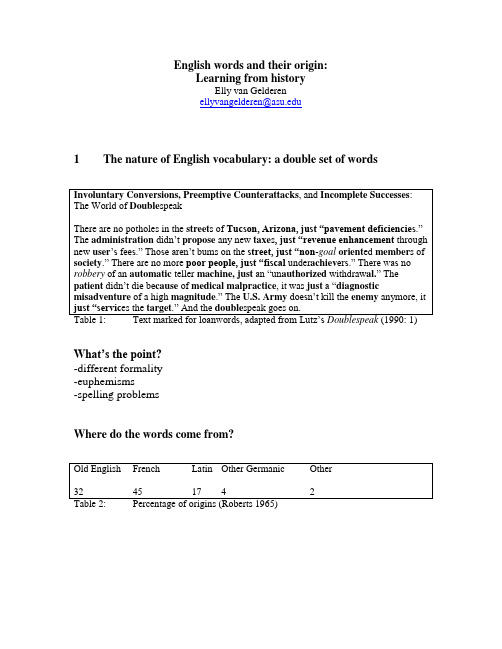
English words and their origin:Learning from historyElly van Gelderenellyvangelderen@1 The nature of English vocabulary: a double set of wordsWhat’s the point?-different formality-euphemisms-spelling problemsWhere do the words come from?Figure 1: OriginsCore and Periphery:(Williams 1975)Figure 2: Core and Periphery2 How did it happen?Figure 4: Just one set of migrations Major Influence: French and LatinLatin loans:Some estimate that between 1500 and 1660 nearly 27,000 new words enter the language (Garner 1982: 151; Wermser 1976: 23).Not all of the new words survive into Modern English. Some of my favorite rejected words are:adminiculation …aid‟, anacephalize …to summarize‟, eximious …excellent‟,illecebrous …alluring‟, ingent …immense‟, and honorificabilitudinitatibus. Minor Influence: Other languagesobvious meanings within ……‟)languages3 What's the use of a `double’ vocabulary?perspire - sweatdonate - givenarrate/describe - tellobtain - getarrive - comeliberty - freedomadolescent - boy/girlAre native speakers aware? YES, to some extentAttitudes regarding `inkhorn terms':George Orwell:-Never use a foreign phrase, a scientific word or a jargon word if you can think of an everyday English equivalent.-Never use a long word where a short one will do.-If it is possible to cut a word out, always cut it out.AND?4 Is English still borrowing?Yes, but lots of compounds, alphabet-soup, etc: `turning inwards' (Minkova & Stockwell 2007)5 Resources: the OED!/lib/resources/db/oed.htmEtymologyFirst date!Language of origin6 ExercisesA Guess which words are Latin or French in:a. A word is deadb. Fire and IceWhen it is said, Some say the world will end in fire, Some say. Some say in ice.I say it just From what I‟ve tasted of desireBegins to live I hold with those who favor fire.That day.But if it had to perish twice,I think I know enough of hateTo say that for destruction iceIs also greatAnd would suffice.Poems by Emily Dickinson and Robert FrostB Simple Search in the OED1: Do a simple search for `tree'. Which of the 12 instances would you click on? Is it a loanword? What other languages is it related to?2: Still using simple search, use a wildcard, e.g. ? means one letter: br?ng or s?ng. Do any words start with y and end in z? Use *.Advanced Search3: Using Advanced Search, look how many instances of `ain't' there are in the entire OED.4: Find all the words that first came in in 1960.5:F irst look up `assasination' in simple search; then in the full text. Difference? 6: Which words derive from Arabic? Search in etymologies!7: How often is Shakespeare quoted?Tables and figures in this handout are taken from the below, unless otherwise marked: Gelderen, Elly van 2006 A History of the English Language. Amsterdam: John Benjamins.。
英语论文:外来语对英语词汇的影响(规范英文版)
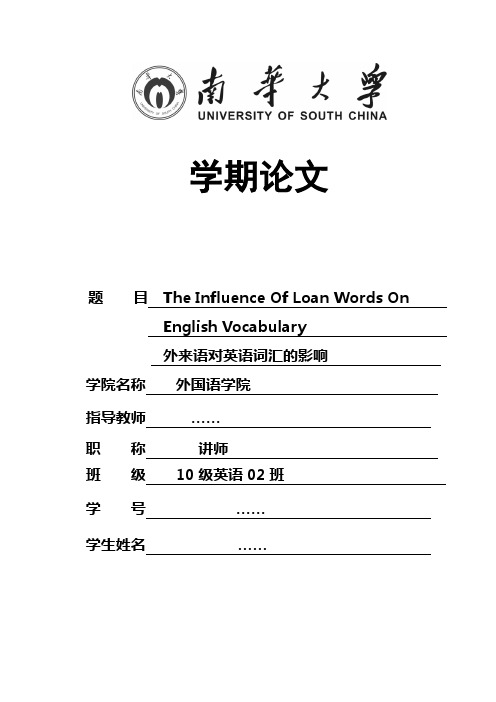
学期论文题目The Influence Of Loan Words On English Vocabulary外来语对英语词汇的影响学院名称外国语学院指导教师……职称讲师班级10级英语02班学号……学生姓名……2011年5月24日AbstractEnglish has become an international language because of its simplicity and richness. Its tolerance and flexibility make it a substantial absorption of loan words, and thus has great vitality. Loan words have greatly enriched the English language, which makes the English expressions more vivid and appropriate. As a result, it occupies a pivotal position in English. This article intends to analyze the influence of loan words on English vocabulary from the origins and types of the loan words in English.Key words: loan words; origin; type; vocabulary; influence摘要英语因它的简单和丰富已经成了一门国际化的语言。
它的宽容和灵活性, 使它大量吸收外来词汇, 从而具有了顽强的生命力。
外来词汇极大地丰富了英语, 使英语表达起来更加生动和贴切, 因此,在英语中占据着举足轻重的地位, 本文拟从外来语的来源和类型来分析外来语对英语词汇的影响。
Chinese Words in English

Chinese Words in EnglishIt is beyond doubt that there are so many English words with the Chinese origin, most of these loan words refer to Chinese objects and concepts such as "fengshui" and "coolie", the Chinese word is "kuli". However, a few, such as "gung ho", the Chinese word is "Gonghe" and "tycoon" Chinese word is "Dakuan", Chinese word has evolved into mainstream usage. Many of the Chinese words made into the English language as pronounced in the Cantonese or Amoy dialect because the early contact between the two cultures happened along the southern Chinese ports of call or through the mostly Cantonese immigrants, for instance, the English word "dim sum" looks like the local English word, however, it comes from the Chinese word "Chadian" in Cantonese dialect. In addition, many of the Japanese words, such as "judo", the Chinese word is "Roudao" or "shinto" the Chinese word is "Shendaojiao" , that were adopted into the English language have a Chinese origin.Loan word:Loan word means a word from another language used in its original form. A substantial part of English words are loan words.The early loan words, because they are translated by the way of combining with English variety and the Chinese pronunciation and have went through the long history of evolution, seem like the local English words. However, they still came from the Chinese words. For instance, the English word "silk" is translated from the Chinese word "Sichou", before the Opium War, British businessman brought the Chinese silk into the western states, however there is no word for it so the British businessman borrowed ideas from the Chinese pronunciation "Sichou" think up the word "silk" for it, by this time the word "silk" still means elegance, nobleness and luxury. And as a bonus, the English word "sycee" is translated from the Chinese word "Yingding" and the "pekoe" is translated from "Hongcha" in Guangdong dialect, the English word "shaw" is translated from the Chinese word "Xiexie" and the "congou" is translated from "Gongfucha" in Xiamen dialect.Most of the modern loan words are just translated into the same Chinese pronunciation like "mao tai", "kow tow", "tai chi chuan", "xiu cai", "gao liang", "wu shu", "gong fu", "erhu", "yangge" and so on.Loan blend:The word which translated by the way of loan blend has two parts one is transliteration the other is the liberal translation.The loan blend not only retains the Chinese national culture characteristic but also integrates with local English words which made foreigner have a pleasant change of atmosphere. The English word "Beijing Opera" is a typical loan blend, the first part "Beijing" is transliterated from the Chinese word of the same pronunciation, the second part is from the local English word "opera" which instead of the Chinese word "Xi" or "Ju". Aside from this word, there are so many words translated by this way like the word "tung oil" is translated from the Chinese word "Tongyou" and the word "Lantian men" is translated from the Chinese word "Lantian Yuanren".Loan translation:Loan translation is the translation method which uses the local English word to translate the unique Chinese things. The words translated in this method have the typical Chinglish style, which can satisfy both the needs of having the vivid and distinctive Chinese characteristics and helping the foreigner understand it easily.So many Chinese words are translated into English words in this way, most of them are Chinese food, for example, the dish "spring roll" in China is called "Chunjuan",the "bagger chicken" in China is named "Jiaohuaji", the "rice noddles" Chinese name is "Mifen". In addition of that there are a lot of other words translated in this way, for example, the words in political field like "paper tigger", "Long March", "Great Leap Forward", "Red Guard", "planned economy", in historical field like "Four Books", "Five Classics", "Eight legged Essay", in culture field like "lunar calendar", "Chinese New Ye ar", "Dragon Boat Festival" and so on.Now, there are so many Chinese words translated into English which are stillretained their Chinese style for many reasons. For instance, the Chinese word "DaMa" was translated into English just called "aunt" a few years ago. However, this word, in 2013 due to the event that Chinese woman rushed to buy gold for gold price falling in the International Gold Market, was transliterated into English called "DaMa" by The Wall Street Journal. Besides that, The BBC used the Chinese word "Tuhao",the meaning of the man makes great fortune overnight, directly without translation. In some ways, we can say that Chinese vocabulary has become the miraculous source of English entries which would bring the advantages far outweigh its disadvantages for Chinese culture spreading all over the world and making the relative cohesion of the nation greatly enhanced to improve China's international status.[1]. 邢杰;甘露. 文化外译之中国特色词汇:策略比较及影响因素[J]. 上海翻译2014(4):20-29[2]. 张慧. 国际关系学院学报[J]. 上海翻译2010(6):12-14[3]. Chen, Baoguo; Zhou, Huixia; Gao, Yiwen; Dunlap, Susan. Cross-Language Translation Priming Asymmetry with Chinese-English Bilinguals: A Test of the Sense Model. Journal of Psycholinguistic Research, v43 n3 p225-240 Jun 2014 [4].Cheng, Chenxi; Wang, Min; Perfetti, Charles A.Acquisition of Compound Words in Chinese-English Bilingual Children: Decomposition and Cross-Language Activation. Applied Psycholinguistics, v32 n3 p583-600 2011[5].Gao, Zhao-Ming.Exploring the Effects and Use of a Chinese-English Parallel Concordancer. Computer Assisted Language Learning, v24 n3 p255-275 2011。
- 1、下载文档前请自行甄别文档内容的完整性,平台不提供额外的编辑、内容补充、找答案等附加服务。
- 2、"仅部分预览"的文档,不可在线预览部分如存在完整性等问题,可反馈申请退款(可完整预览的文档不适用该条件!)。
- 3、如文档侵犯您的权益,请联系客服反馈,我们会尽快为您处理(人工客服工作时间:9:00-18:30)。
lit. hurry, urgent. • Chow - from Chinese Pidgin English chowchow which means food, perhaps based on Cantonese 炒, lit. stir fry (cooking) • Doufu - from Mandarin 豆腐 (dou fu), lit. beancurd
Brainwashing
洗脑,罢官 Etymology: translation of Chinese (Beijing) Date: 1950 1 : A forcible indoctrination to induce someone to give up basic political, social, or religious beliefs and attitudes and to accept contrasting regimented ideas 2 : persuasion by propaganda or salesmanship –Brainwashing is translated from Chinese literally, word by word. 脑 means brain, 洗 means wash. The word had then been put together in the English language way--Brainwashing.
• Ginseng - from Mandarin 人參 (renshen), name of the plant.
• Ketchup - possibly from Cantonese or Amoy 茄汁, lit. tomato sauce/juice
• Kung Fu - the English term to collectively describe Chinese martial arts; from Cantonese 功夫 (Gongfu), lit. efforts
• Soy - From Chinese 醬油, (Mandarin jiàngyóu).
• Tea - from Amoy 茶 • Typhoon - 颱風; a great windstorm, hurricane, from taiî (great) fung (wind) • Wok - from Cantonese 鑊
• Longan - from Cantonese 龍眼, name of the fruit • Lychee - from Cantonese 荔枝 (laitzi), name of the fruit
• Mahjong - from Cantonese 麻將 (mah-jeung), lit. the mahjong game • Mu Shu (pork) - from Mandarin 木須 (mùxū), lit. wood shredded • Shih Tzu - from Mandarin 獅子狗, lit. Chinese lion dog • Silk - possibly from 'si' 絲, lit. silk
• Bok Choy - 白菜 a Chinese cabbage: literally 'white vegetable' .
Dim Sum - from Cantonese 點心 (dimsam), lit. little heart. • Ramen - Japanese ラーメン, gairaigo, from Chinese 拉麵 (Lamian) lit. pulled noodle.
•Tai Chi - from Mandarin 太極
Won ton - from Cantonese 雲吞 , lit. 'cloud swallow' as a description of its shape, similar to Mandarin 餛飩
• Yin Yang - 陰陽 from Mandarin 'Yin' meaning feminine, dark and 'Yang' meaning masculine and bright.
• China - 秦; Name of the Qin Dynasty. The West appears to have named China after the first dynasty to unify the country. The Chinese call their country zhong guo (中國) or Central Country.
